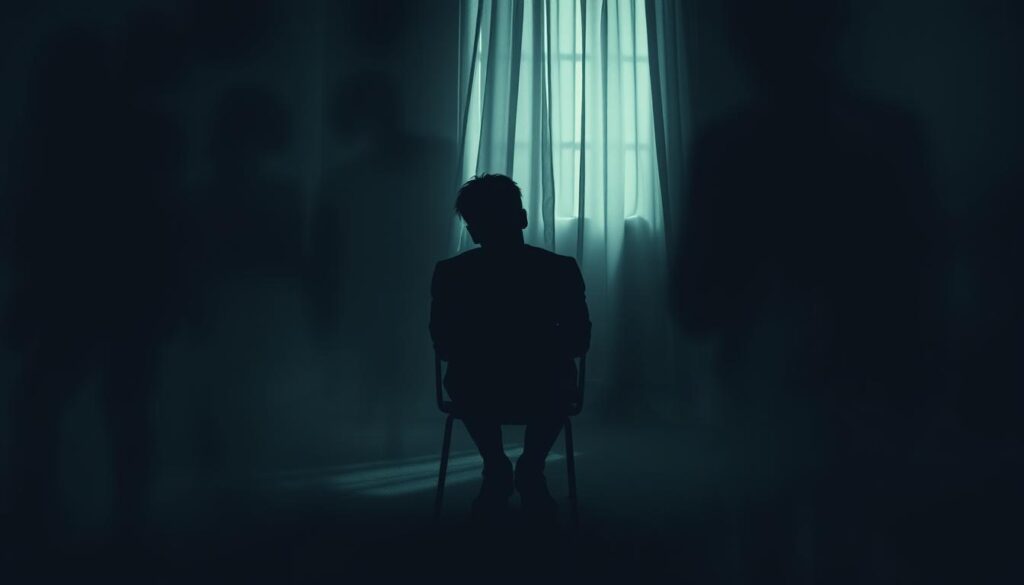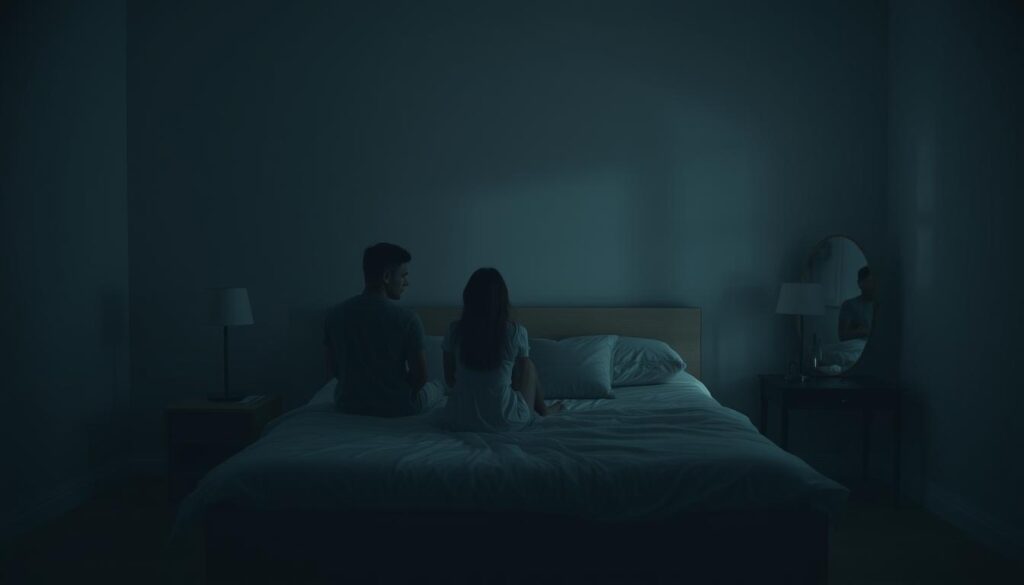Erectile dysfunction (ED) is a common issue that mainly affects men over 40. While most cases have a physical cause, some younger men might face a psychological issue. ED can lead to problems in relationships, affect self-esteem, and cause feelings of shame and anxiety.
Research by the Irish Heart Foundation shows that nearly 20% of men in their 50s have ED. This number jumps to 38% in men in their 60s and 57% for those over 70. ED can harm one’s mental health, causing depression, low self-esteem, and feelings of guilt and anger.
The emotional and relationship impact of ED is significant. Men often hide their struggles, making the real numbers higher than reported. Hormonal changes due to stress can also worsen ED, adding to the emotional burden. Seeking effective treatments and using coping strategies like counseling can help manage these effects.
Psychological Causes and Effects of Erectile Dysfunction
Erectile dysfunction (ED) is more than just a physical problem. In fact, 10%-20% of all cases of ED are caused by psychological factors. The main psychological causes include stress, anxiety, and performance anxiety.
Stress can come from many areas, like work, money, or marriage issues. When a man has ED, he might worry it will happen again. This worry can lead to a cycle of “performance anxiety” that causes ED. This makes him feel inadequate and lose confidence in himself.
Depression, Guilt, and Low Self-Esteem
ED’s psychological effects go beyond just anxiety and stress. Men with ED often face depression, guilt, and low self-esteem. They might feel guilty for not pleasing their partner, and depression can cause ED even in comfortable situations. Past ED episodes can make them feel inadequate and lower their self-esteem, adding to the emotional strain.
It’s important to address the psychological side of ED for a full treatment. Counseling, therapy, and a mix of medication and lifestyle changes can help. These steps can help men deal with the emotional weight of ED and improve their overall well-being.

ED psychologocal impact and its Relationship Consequences
Erectile dysfunction (ED) can deeply affect your mental health and relationships. If not treated, it can cause anxiety, depression, and lower self-esteem. It can also strain your relationship with your partner.
Your partner might feel confused, anxious, or even think you’re being unfaithful. This can lead to resentment and frustration in your relationship. ED can make you lose your sexual identity and intimacy, causing problems in your bond.
Erectile dysfunction affects most men at some point in their lives. It can make you feel less confident and anxious. Relationship issues, like stress and arguments, can make ED worse.
Breakdowns in communication because of ED symptoms can also worsen the situation. The emotional and psychological effects of ED can be severe for both you and your partner. If not addressed, it can lead to feelings of frustration and anger in you, and make your partner feel unattractive and unwanted.
It’s important to tackle the root causes of ED, whether they’re physical or mental. This is key to bringing back intimacy and satisfaction in your relationship.
| Causes of Erectile Dysfunction | Percentage |
|---|---|
| Physiological factors (e.g., heart disease, high cholesterol, diabetes) | 80% |
| Psychological factors (e.g., stress, anxiety, relationship issues) | 20% |
Getting professional help, through medication or therapy, can help address ED’s psychological and relationship effects. By tackling the underlying issues, you can regain your sexual confidence. This can help restore intimacy with your partner, making your intimate life more fulfilling.

Remember, you’re not alone in dealing with ED. With the right support and treatment, you can overcome its psychological and relationship challenges. This way, you can reclaim your sexual well-being.
Coping Strategies for Couples Affected by ED
Dealing with erectile dysfunction (ED) can be tough for both the person and their partner. But, there are ways couples can handle this issue and keep their relationship strong. They can find support and ways to stay connected.
Counseling and Therapy
Going to counseling or therapy can be a big help. It offers a safe place for couples to talk about their feelings. They can work on supporting each other and improving their communication.
It’s especially important for couples to address any relationship issues that might be linked to ED. This can help reduce feelings of isolation and deepen their understanding of each other.
Individual therapy can also be very helpful. It lets the person with ED deal with feelings of depression, guilt, and low self-esteem. By tackling the psychological causes and effects of erectile dysfunction, couples can find better ways to cope and strengthen their bond.
Exploring other ways of being intimate can also be beneficial. Activities like cuddling, massage, and exploring non-penetrative sex can keep the relationship fulfilling. This is especially good for the partner’s mental health and emotional connection.
Treatment Options for Erectile Dysfunction
Dealing with erectile dysfunction (ED) can feel overwhelming. But, there are many ways to help. Options range from pills to injections and even surgery. These can help you feel better and improve your relationship.
Oral medications like sildenafil, tadalafil, vardenafil, and avanafil are often used. They help by making blood flow better in the penis. This makes it easier to get an erection when you’re turned on.
But, these pills aren’t magic. They work best when you follow your doctor’s advice. They’re not aphrodisiacs, but they can really help with ED.
If pills don’t work, there are other choices. You might try injections, suppositories, or vacuum devices. For example, alprostadil injections work fast. But, you need to be careful to avoid problems like priapism.
For some, surgery like penile implants is an option. These implants let you create an erection yourself. They’re a lasting fix for those who’ve tried everything else.
Choosing a treatment is a big decision. You should talk it over with your doctor. With the right help, you can beat ED’s emotional and relationship effects. You can get back to enjoying a fulfilling intimate life.
The Link Between ED and Cardiovascular Health
If you’re dealing with erectile dysfunction (ED), it’s key to know its link to heart health. Studies show ED often signals heart disease early on.
The arteries that supply blood to the heart and those in the penis are similar. They can both develop blockages. ED can signal heart disease up to 5 years before symptoms appear.
More than half of men with heart disease also have ED. One in eight men with ED has had heart disease. A recent study found men with ED are 59% more likely to have heart disease and 34% more likely to have a stroke.
The Framingham Heart Study linked high cholesterol and hypertension to heart disease. ED is also a sign of future heart problems. Younger men with unexplained ED face a 50-fold increase in heart disease risk.
If you have ED, talk to your doctor. They can check for heart risks and help with treatment. This approach can improve your health and lower heart disease risk.
| Statistic | Value |
|---|---|
| Worldwide prevalence of ED | 13% to 71% |
| Men with a history of CVD who have ED | More than 50% |
| Increased relative risk of IHD in men with ED | 59% |
| Increased relative risk of stroke in men with ED | 34% |
| Increase in 10-year incidence of heart disease in younger men (40-49) with unexplained ED | 50-fold |
Conclusion
Erectile dysfunction can deeply affect your mental health and your relationship. It can make you feel less manly, ashamed, and less confident. It also harms your mental health and life quality. Your partner might feel rejected, frustrated, and less attractive.
But, you and your partner can face these challenges together. Talking openly, seeking counseling, making lifestyle changes, and using treatments like PDE5 inhibitors can help. These steps can bring back a fulfilling connection and boost your well-being. Remember, over 95% of men with ED can be treated successfully.
By dealing with erectile dysfunction together, you can overcome it and make your relationship stronger. With the right support and approach, you can regain your sexual confidence and intimacy. This will not only improve your sex life but also your physical and mental health.










